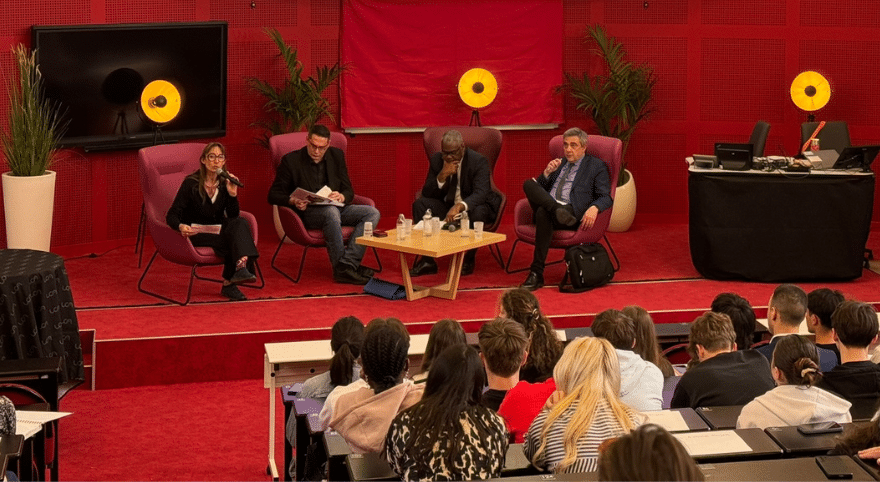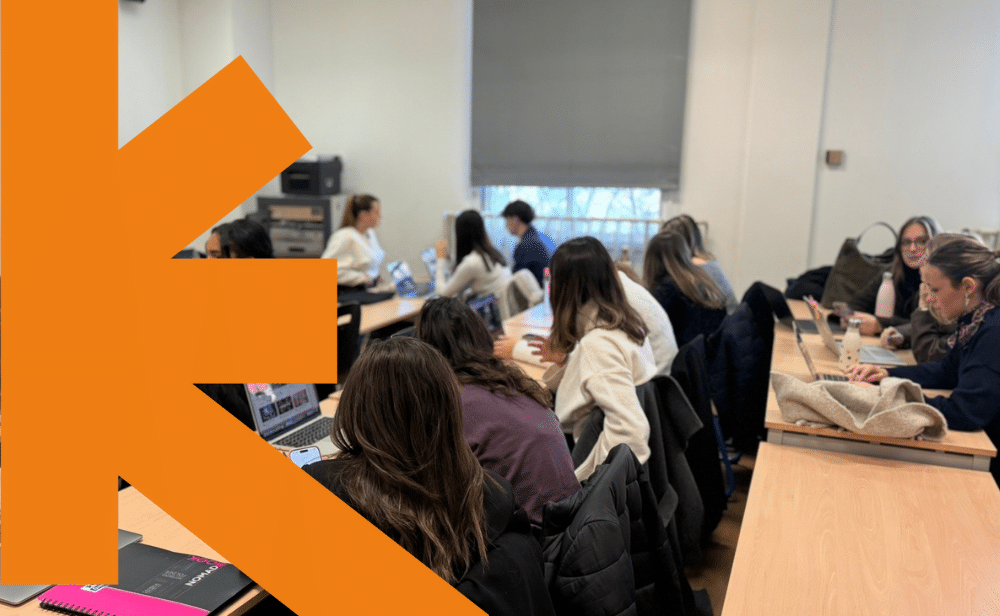

- Clermont School of Business
- International
- Study with us
- Programs
- Bachelor in International Management
- Bachelor in Digital Marketing & E-Commerce Management
- Master in Management
- Programme Grande Ecole online
- MSc – Master of Science Business Intelligence & Analytics
- MSc – Master of Science Corporate Finance and Fintech
- MSc – Master of Science Digital Marketing & Artificial Intelligence
- MSc – Master of Science International Commerce & Digital Marketing
- MSc – Master of Science Project Management
- MSc – Master of Science Procurement & Supply Chain Management
- Doctorate of Business Administration (DBA)
- Executive Education (French only)
- Discover the Master in Management majors
- International Students
- Summer School
- Tools & pedagogical support
- Programs
- Faculty & Innovation
- Company & Career
- News & Events
Two Clermont SB Students Face the Prefect to Defend the Future of Water
On Monday, March 24, 2025, two students from Clermont School of Business spoke at a high-level public discussion dedicated to the future of water management in the Puy-de-Dôme region. Engaged, structured, and presenting concrete proposals, our students showcased the skills they developed through the Grande École Program, specifically within the strategic module “Businesses Facing the Geopolitics of the Environment”, designed and coordinated by Dr. Elda Nasho Ah-Pine, a permanent professor in geopolitics.
A Public Debate on Water Management
Organized by the Prefecture of the department, the event “Facing the Students – Water Theme” brought together local authorities, institutional stakeholders, and students from several higher education institutions in the region, including VétAgro Sup and IAE Clermont Auvergne.
On this occasion, Marie Treuillet (PGE2 Alt. Finance) and Pavel Petrachi (PGE2 Alt. Marketing) brilliantly represented Clermont School of Business. In the presence of Prefect Joël Mathurin and representatives from the Puy-de-Dôme Department and Clermont Auvergne Métropole, they delivered a well-structured and engaged discourse on the major challenges related to water resources.

Pavel Petrachi opened the debate by questioning the governance principles of shared resources, as proposed by Nobel Prize winner Elinor Ostrom:
“To what extent could the governance principles of shared resources advocated by Elinor Ostrom (local self-management, collective regulation, mutual monitoring) be tested in local water management?”
Marie Treuillet, on the other hand, challenged the authorities on infrastructure efficiency and intergenerational justice:
“How can we optimize infrastructure management and leverage key mechanisms while minimizing leak risks and ensuring equitable access to water for future generations? And with the forecasted water stress for 2040, how can local governments anticipate and adapt?”
Winners of the student symposium on water access in the MENA region, both students drew on the skills developed within the “Businesses Facing the Geopolitics of the Environment” module. With the rigorous guidance of Dr. Elda Nasho Ah-Pine, they were thoroughly prepared, both in terms of scientific content and public speaking skills.
New: A Strategic Module to Understand and Act on Global Environmental Challenges
This year, in response to global challenges such as planetary limits and inequalities in resource access, Clermont School of Business has made the “Businesses Facing the Geopolitics of the Environment” module mandatory for all PGE2 students.
Designed and coordinated by Elda Nasho Ah-Pine, a permanent professor at the School, this module reflects a strong commitment: to train future managers who can think globally about environmental, geopolitical, and social issues—and address them with rigor and engagement.
The module offers students an in-depth exploration of geopolitical climate issues, integrating economic development, equitable access to resources, and respect for planetary boundaries.
Learning Objectives
- Understanding current geopolitical and environmental tensions related to development dilemmas
- Developing informed decision-making and structured argumentation
- Encouraging interdisciplinary collaboration in addressing climate challenges
- Producing impactful visual materials to propose sustainable solutions
Key Issues & Regions Explored
- Sustainable Energy Access – Sub-Saharan Africa, North America
- Food Security & Sustainable Agriculture – South Asia, European Union
- Water Management & Access – Middle East, North Africa, Scandinavia
Through their speeches before local authorities and regional stakeholders, Marie Treuillet and Pavel Petrachi embodied the core goals of the module: to analyze with precision, debate with clarity, and propose responsible actions in response to major environmental challenges. Their intervention further illustrates Clermont School of Business’ commitment to training a generation of enlightened managers—professionals capable of linking academic expertise, civic engagement, and sustainable business transformation, in alignment with the Sustainable Development Goals (SDGs) of the 2030 Agenda.
A Module That Brings Ideas to Life Beyond the Classroom
Beyond debates and public speaking, the student projects from this module have resulted in tangible outputs in the form of an exhibition.
In February 2025, a selection of 12 winning posters was displayed at the School. These projects—combining scientific analysis, critical reflection, and climate engagement—focused on resource access and environmental sustainability. A collaborative mural, showcasing all student contributions, is also currently in development.
These posters will be featured again at the Corporate Climate Convention (CEC) – Massif Central, held at Clermont School of Business from May 14 to 16, 2025. Displayed throughout the event, they will help business leaders and economic stakeholders reflect on the necessary business model transformations in the context of the ecological transition.
Did You Know?
For several years, Clermont School of Business has integrated awareness modules on major contemporary challenges—including climate change—into all its programs.
As a higher education institution, its mission is to train responsible managers and entrepreneurs who place both people and the planet at the heart of their decision-making.
To develop students’ critical thinking and encourage active awareness, the school prioritizes immersive pedagogy, featuring collaborative workshops that leverage collective intelligence—fostering both individual and collective action strategies.
Related with

Stay updated with the latest news from Clermont School of Business by subscribing to our newsletter!
Merci ! Vous êtes maintenant abonné(e) à notre newsletter.
Vous recevrez dorénavant notre newsletter mensuelle.
@bientôt
We faced problems while connecting to the server or receiving data from the server. Please wait for a few seconds and try again.
If the problem persists, then check your internet connectivity. If all other sites open fine, then please contact the administrator of this website with the following information.
TextStatus: undefined
HTTP Error: undefined
Some error has occured.



